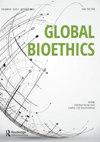Islam and palliative care
Q1 Arts and Humanities
引用次数: 16
Abstract
Palliative care is experiencing an upsurge in interest and importance. This is driven, paradoxically, by modern medicine's increased ability to provide effective pain relief on the one hand and an acknowledgement of its limitation in delivering a cure for certain diseases on the other. With many Muslims suffering from such incurable diseases worldwide, they too are now faced with the decision of whether to avail themselves of pain relief offered within the framework of scientific medicine. However, while the general ethos of palliative care which is to promote the quality of life of those facing life-limiting illnesses is consistent with Islamic values, this paper explores whether the same can be submitted for modern methods of pain control. The investigation will be steered by two overriding questions. First, if pain and suffering could, as highlighted in the primary sources of Islamic Law, lead to the expiation of sins, can pain relief be taken? Second, is it religiously permissible to choose pain treatment options that could bring about iatrogenic addiction, the hastening of death and the impairment or obliteration of consciousness?伊斯兰教和姑息治疗
姑息治疗正在经历兴趣和重要性的高涨。矛盾的是,一方面,现代医学提供有效疼痛缓解的能力不断增强,另一方面,人们认识到现代医学在治疗某些疾病方面的局限性。全世界有许多穆斯林患有这种不治之症,他们现在也面临着是否利用科学医学框架内提供的疼痛缓解的决定。然而,虽然姑息治疗的一般精神是促进那些面临生命限制疾病的人的生活质量与伊斯兰价值观是一致的,但本文探讨了是否同样可以提交给现代疼痛控制方法。调查将围绕两个重要问题展开。首先,如果痛苦和折磨,正如伊斯兰教法的主要来源所强调的那样,可以导致赎罪,那么疼痛是否可以得到缓解?其次,宗教是否允许选择可能导致医源性成瘾、加速死亡和意识受损或丧失的疼痛治疗方案?
本文章由计算机程序翻译,如有差异,请以英文原文为准。
求助全文
约1分钟内获得全文
求助全文

 求助内容:
求助内容: 应助结果提醒方式:
应助结果提醒方式:


